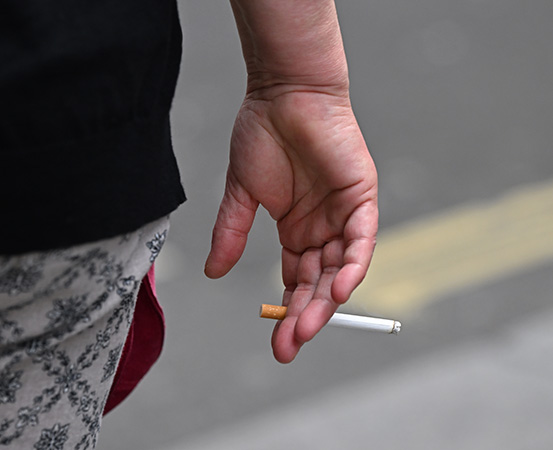
Public service health messages like “Smoking causes lung cancer” and “Smoking Kills!” broadcasted across the globe make us aware of the fact that smoking is harmful to our lungs. Most of us are also aware of its cardiac and vascular impacts including heart attack, hypertension and stroke. However, experts point out that most people are still unfortunately oblivious of the fact that smoking could also damage liver functions and lead to serious complications, including liver cancer.
“The general notion is that smoking affects the respiratory system and causes asthma, lung cancer and stroke. However, there is evidence that smoking affects a lot of other organs and can even cause direct injury to the liver,” says Dr Sanjeev Rohatgi, lead consultant, Liver Transplant and HPB Surgery, Manipal Hospital, Whitefield, Bengaluru.
READ MORE :
Why liver damage could be bad news for the brain too
Pruritus: That itch could be linked to your liver
Dr CP Tanwar, consultant, Gastroenterology, Fortis Escorts Hospital, Jaipur, points out that many people who come to him complaining of upper abdominal discomfort, burning epigastrium (acid reflux in the area between the ribs and upper abdomen) and heartburn have a long history of smoking and alcohol consumption.
“During routine investigations, these patients are found to have deranged liver function tests, fatty liver and fibrosis on conducting a FibroScan or other blood tests,” he adds.
Smoking is also an additional factor that could aggravate existing alcohol induced liver complications including fibrosis or scarring of liver tissues.
Why is smoking harmful for the liver?
Tobacco not only contains harmful carcinogens, but also has oxidative stress-inducing agents that can increase inflammation and stress, thereby damaging hepatic cells in the liver. It also drastically reduces the liver’s ability to detoxify our blood.
“Tobacco contains a lot of inflammatory substances which can directly affect the liver. It will also have adverse effects on our immunity,” says Dr Rohatgi. He also adds that the cellular damage caused because of the severe inflammation often leads to fibrosis (scarring of the liver) and liver injury.
How does smoking affect our liver?
According to an article published in World Journal of Gastroenterology, smoking effects liver health in multiple physiological ways including triggering of adverse immunologic, toxic and cancer causing mechanisms.
Majority of the toxic effects is caused as smoking increases oxidative stress. Nicotine and other harmful by-products in cigarettes trigger the release of pro inflammatory cytokines that leads to liver cell injury and fibrosis. Dr Tanwar lists the release of these cytokines as a major reason for further worsening of liver diseases in most cases.
It has also been pointed out that smoking could have a negative impact on general immunity, making the smoker more susceptible to infection. Dr Tanwar also says that smoking could induce the death of lymphocytes, a type of White Blood Cell (WBC) that is involved with antibody production and our general immune response. More research is being carried out to fully understand how smoking affects immunity.
Smoking and liver cancer
A research article that pooled data from 14 US-based cohort studies to trace the cause and manifestation of liver cancer, found that smoking and heavy alcohol consumption were among the main reasons for liver cancer.
“Smoking produces lot of carcinogenic substances like tar, hydrocarbons, etc. which cause an increased risk of liver cancer,” says Dr Rohatgi.
It was also concluded that smoking cessation and lowering alcohol intake considerably reduced the risk of hepatocellular carcinoma (primary liver cancer). The Centres for Disease Control (CDC) also lists smoking as a risk factor for liver cancer.
Link between smoking and NAFLD
NAFLD (Non-alcoholic fatty liver disease) is a condition where excess fat is accumulated in the liver, causing liver damage and inflammation. Smoking contributes to the development and progression of NAFLD by increasing oxidative stress and inflammation in the liver, especially among middle-aged individuals.
Dr Ravi Kiran, consultant, Hepatology & Liver Transplantation, Narayana Health City, Bengaluru, adds that fatty liver disease affects 25 percent of the population worldwide and 20 percent of them have a history of smoking. People with a history of smoking and fatty liver can have advanced fibrosis, independent of age and a history of diabetes.
Effects of smoking with a liver disease
Smoking increases the progression of liver diseases and risk of other complications. It can also worsen any existing liver conditions. The American Cancer Society has rated smoking accompanied by alcohol consumption as a major risk factor for liver cancer.
“People who consume alcohol are more likely to smoke heavily compared to non-drinkers. This automatically increases the chances of liver disease among them,” adds Dr Kiran.
Some studies also indicate that smoking elevates the risk of liver cirrhosis, independent of alcohol intake.
Dr Rohatgi says that people with existing liver conditions must absolutely avoid smoking.
“It increases cancer risk and could lead to fibrosis in those with fat deposits on their liver,” says Dr Rohatgi. He adds that a smoker should ideally quit smoking at least three months before undergoing a liver surgery.
Dr Kiran adds that smoking has a negative impact on the outcomes of liver transplantation. Several studies also point out that some of the post-transplant complications are vascular in nature (including stenosis and cholesterol complications) for which smoking has been established as a major risk factor.
Takeaways
- Smoking impacts our liver health. Experts point out that smoking along with alcohol consumption are among the main reasons for all adverse liver conditions including cancer.
- It has been pointed out that the inflammatory effect of nicotine and other contents in tobacco could be a major contributor of NAFLD. Smoking accelerates liver damage in those with excess alcohol consumption.

















